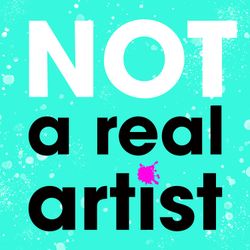Latest episode

24. EP24: Make Shitty Art
37:46||Season 5, Ep. 24In episode 24 we talk about what we've been up to since the last season1.Creativity isn't just painting; it's any form of making. Building in Minecraft, sewing, even a self-development practice like running it’s all creative.2.Like Caylee Grey says more than zero is enough. Tiny efforts beat perfection. Your momentum can be gentle. You don't have to strong arm yourself. 3.Protect your private practices. Teaching and public work can drain, so keep a space where it's just you and the sketchbook to keep your well full 4.Prompts and challenges, are inspiration or permissions, not obligation. Feel free to repeat themes. Skip days, change your mind, keep it fun or make your own challenge 5. Resist sameness and curation. Let your art be messy, personal, specific to you. The call to action is make shitty art.Have questions or topic suggestions? Write to us at notarealartistpodcast@gmail.com,
More episodes
View all episodes
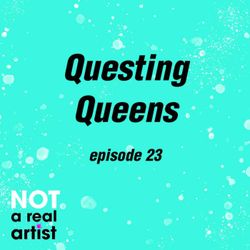
23. EP23: Questing Queens
37:53||Season 4, Ep. 23In episode 23 we talk about games and being gamers. We explore what makes one a gamer, the different types of games we engage in (board, video, TTRPG) and our feelings around the label and the activity.Key Takeaways 1. The label of "gamer," like "artist," can be difficult for us to claim. When we examine why, we see that we sometimes feel too casual about it, believing we don’t invest enough time or effort to deserve the label.2. We find that gaming serves as a social activity. Both video games and board games allow us to bond with friends and family, whether through collaboration or competition.3. We notice that we have personal judgments around gaming being a lesser or wasteful hobby. So we try to remind ourselves that: A. The artistry of games in terms of storytelling, visuals, and mechanics is valid. B. Playing games gives us chances to experience and work through emotions, helping us develop resilience. C. Games put us in unique scenarios that can be cathartic. D. Gaming enables us to build skills and potentially hone our own storytelling.4. In both art and gaming, we find that the process, so the storytelling and the journey, is just as important, if not more so, than the win or level-up moment.Write to use about your favourite games at notarealartistpodcast@gmail.com, feel free to share this podcast with a friend and remind them that they have just lost the game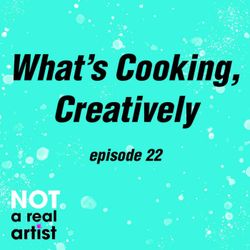
22. EP22: What's Cooking, Creatively
47:20||Season 4, Ep. 22In episode 22 we talk about all the ways in which we have been creative recently, and explore what it means to engage in different artforms and how it relates to our creativity as a whole.Key TakeawaysWe usually paint to express our creativity; therefore, it can sometimes feel like anything that is not painting, isn’t necessarily creative, or has no common thread with our main creative practice.You will find that you’re the common thread! You are the thing that connects all your expressions of creativity whether visual or not.Creativity can also look like; cooking with new ingredients or trying new recipes, running a fantasy RPG game, learning new subjects, making bracelets and comics.Your additional creative pursuits don’t have to be healing, and if it does feel like it is therapeutic, that is a happy bonus!Whether your final creative outcomes are enjoyed just by you, or an audience (like your family), your creativity is meeting a need.We hypothesise that these needs are:Needing to feel connected and lovedNeeding to be seen or validatingNeeding to show up for self and not self-abandoningEmail us: notarealartistpodcast@gmail.com (you can let us know what you enjoyed, what your 'AHA' moments were, or any questions you'd like us to answer or topics you'd like us to discuss in a future episode)IrisInstagram: https://www.instagram.com/iris.impressions.art/TamaraInstagram: https://www.instagram.com/ruskea_art/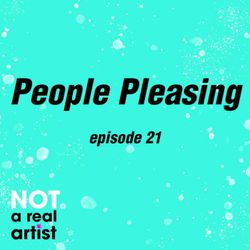
21. EP21: People Pleasing
44:50||Season 4, Ep. 21In episode 21 we talk about people pleasing. We explore why we do it, what it means, the positive and negative sides to it and how to move towards having healthier boundaries in all areas of life. Key Takeaways:1. The term people pleasing; refers to all humans, that one may willingly do things for, at the expense of oneself.2. The act of people pleasing is about controlling how others may view you, act towards you, and often generates resentment in the person doing the pleasing.3. People pleasing can also come from an inherent sense of unworthiness. Therefore we feel we need to add value or become worthy people to combat that idea.4. People pleasing can also be aided by the discomfort in setting boundaries and the expected or imagined conflict that that action may bring. 5. In art and in life, self-awareness and self-reflection are going to be the things that serve you in understanding: a. Are you trying to control someone’s thoughts, feelings, or reaction? b. Are you feeling resentful? c. Is the need or want you’re anticipating true? d. Is the urgency or danger you’re feeling to fulfil this perceived need real?6. At the same time, we shouldn’t gaslight ourselves and deny: a. We have cultural expectations, and a difference in in the philosophies we grow up with. b. Our experiences are valid, and that the definition of danger or urgency depends on our situations.7. People pandering and boundary work BOTH use energy: a. However, people pleasing has a perpetual use of energy. b. Whereas boundary work might have a larger investment at the start but a maintenance energy as time goes on.8. The choice therefore lies with the individual, and which energy they feel costs them the least.Enjoyed the podcast? Please rate, review & share it with anyone who might enjoy it or find it useful! Thank you for joining us!Email us: notarealartistpodcast@gmail.com (you can let us know what you enjoyed, what your 'AHA' moments were, or any questions you'd like us to answer or topics you'd like us to discuss in a future episode)IrisInstagram: https://www.instagram.com/iris.impressions.art/TamaraInstagram: https://www.instagram.com/ruskea_art/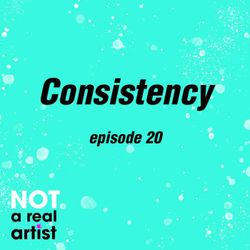
20. EP20: Consistency
44:53||Season 4, Ep. 20In episode 20 we discuss the double edged sword of consistency; how to find consistency and stay consistent in our art practice, whilst staying true to the messy and unplannable nature of being an artist. Key Takeaways:Consistency can be used as a useful tool or a rod for your back.Some of us can use routine as a container or reminder to be consistent.A label can be used to give you permission to use the concessions and tools that you feel are only available to a specific label.Using consistency as a benchmark, when it isn’t in line with who you are and how you work, sets you up for failure.Instead try putting the focus on what you create, and whether what you’re doing is important or meaningful to you.The only thing that needs to be consistent is showing up, and the way you show up can be inconsistent – consistently inconsistent.Consistency can be used by some, as a survival mechanism and way to avoid pain. Where we actively put our feelings into a box in order to reach consistency.While for others, consistency is a part of their cycle, the way they get work done, or the tool their brain needs to use; to burn out less or just get stuff done.Making art that truly comes from inside you has inconsistency attached to it, as it changes each time.Not making art every day – does not mean you are not an artist.However, it does take consistent practise to learn art skills. What matters is that you define consistent for yourself.To foster consistency and use it as a tool you could: create deadlines, do what you enjoy first to gain momentum and use timers as you work.Most importantly you may not be able to use all or any of these effectively or frequently, it is about finding what works for you; whether you are consistently inconsistent, or not. Enjoyed the podcast? Please rate, review & share it with anyone who might enjoy it or find it useful! Thank you for joining us!Email us: notarealartistpodcast@gmail.com (you can let us know what you enjoyed, what your 'AHA' moments were, or any questions you'd like us to answer or topics you'd like us to discuss in a future episode)IrisInstagram: https://www.instagram.com/iris.impressions.art/TamaraInstagram: https://www.instagram.com/ruskea_art/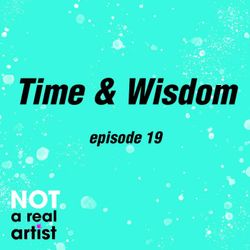
19. EP19: Time & Wisdom
49:22||Season 4, Ep. 19We're back with a new season! Kicking things off in episode 19 we discuss struggles with long-term creativity and the continuing path we are on, insights on who we are on social media and the challenging yet rewarding endeavour of making new friends as an adult.Key Takeaways:There is no switch that takes you from being busy with work or life, to being creative. It instead takes time and space. Sometimes being pulled away from your art practise mid-flow is painful, in these instances, we might decide we don’t have enough time to enter and enjoy the state of flow – so we don’t engage in the practise.The journey of painting or moving closer to oneself is a path. You are already on the path, and even when you aren’t actively making or producing art, that struggle is still considered movement, along said path.We feel a frustration when we see people who appear to lack authenticity or "edges" on social media.The complexity of social media personas exits, and what people share online is only a fraction of their true selves, we too have curated ourselves online.There is discomfort in seeing people online in our communities who ignore topics of human rights yet talk about love and light.Making friends as an adult is challenging, but possible! Friendships are an investment and need to be reciprocal in energy, while also considering that you need to be mindful of the ebbs and flows of said relationships.Remember to create space for friendships, and be intentional about inviting those connections in, and terminating them when they aren’t right.Enjoyed the podcast? Please rate, review & share it with anyone who might enjoy it or find it useful! Thank you for joining us!Email us: notarealartistpodcast@gmail.com (you can let us know what you enjoyed, what your 'AHA' moments were, or any questions you'd like us to answer or topics you'd like us to discuss in a future episode)IrisInstagram: https://www.instagram.com/iris.impressions.art/TamaraInstagram: https://www.instagram.com/ruskea_art/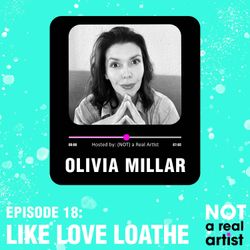
18. EP18: Like Love Loathe ft Olivia Millar
01:07:00||Season 3, Ep. 18In this final episode of season 3 we talk to Professional Life Coach Olivia Millar, about our personal superpowers, balance and how to access lasting change!Find Olivia:Instagram: @olivia.millar.anewFacebook:@AnewOutcomeWebsite: www.anewoutcome.comChallenge Text: I'm going through a coaching exercise and I've been asked to reach out to people I respect and admire. If there's one trait of mine that you could take on board, what would that trait be? I would appreciate the feedback and of course I can return the favour!Key TakeawaysWhat’s your superpower? Can you list two things that make you uniquely you? It could be your sense of humour, or ability to see potential in others!Knowing how you process information can be useful. This can help you communicate more effectively with self and others. And in some cases, it can be a label that helps you make other connections with your other forms of thinking.You can try to reframe your thinking around weakness and limitation by asking: How does this serve me? OR how does this create space for what I view as strengths to come to play?You can also take note and collect data around a limitation you may want to change. And build habits OR systems that support the limitation. Give yourself the tools to not be beholden to the limitation.Also note that not having judgement towards the limitation might make it easier to access the tools or systems you need. That’s where viewing it with neutrality will help.When faced with a situation or limitation that produces emotion, we start assigning meaning to those feelings very quickly. Try taking time to physically feel those feelings, and once that happens, then assign meaning to them. Remember this is a practise.Try out the exercise given, where you reach out to 50 people and ask them to provide you with 1 aspect of yourself, they’d take on board.Use the feedback to understand the threads across areas that makes you, your superpower and then use it as fuel!Instead of Self-love, or Self-loath, try "Self-Like". This feels like a more accessible and a softer place to enter than the other two extremes.Being positive and embodying what you want to see in the world will wire your brain to start seeing more of that in your space.Making sure that the wiring is working for us is also important, actual positivity vs. denial are two different spaces.Sometimes we’re using language; a conscious construct to express things that we cannot articulate. Which is where art and symbology or even grunts and physical movement comes in to help us express what we feel.Reframe the parts of you that feel as if they’re in conflict with each other as two sides of the same coin – all our experiences culminate to create a person that is us, who brings something unique to the table.Remember that lasting change has to be slow and incremental. So any advice or ideas you take on from this episode can be implanted with ease and grace!Thank you for listening to the NOT a real artist podcast! Have you had any insights during this episode? Let us know on notarealartistpodcast@gmail.com. If you haven’t already, please follow this podcast or rate it and share it with everyone who wants to listen to good shows!Iris | IG: https://www.instagram.com/iris.impressions.art/Tamara | IG: https://www.instagram.com/ruskea_art/
